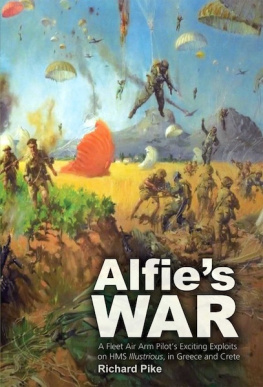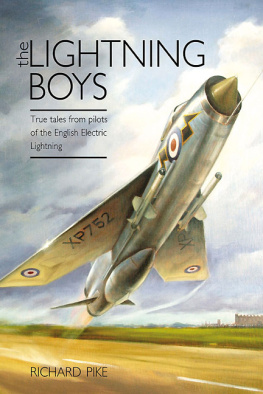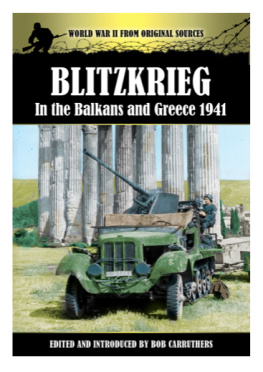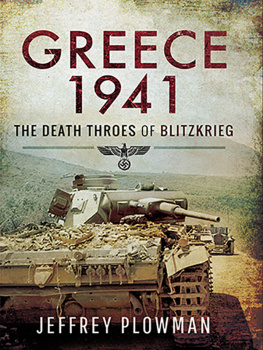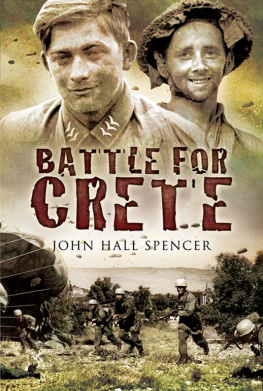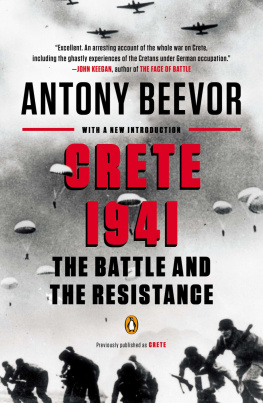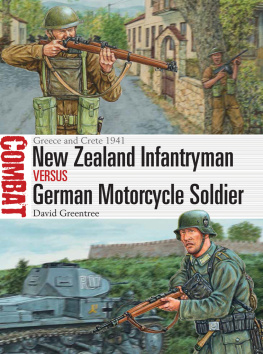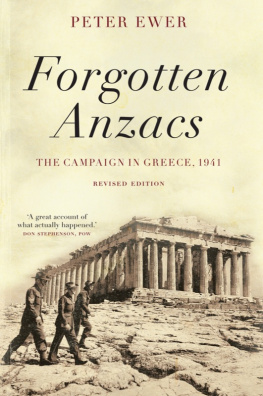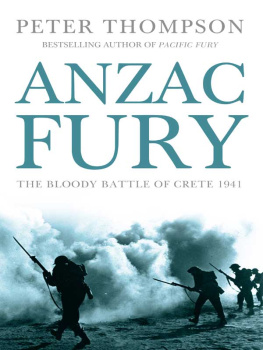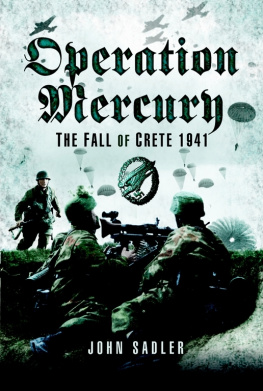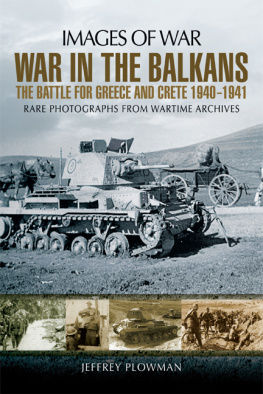A sequel to Seven Seas, Nine Lives
more war experiences of
Captain A W F Alfie Sutton CBE DSC* RN
Published by
Grub Street Publishing
4 Rainham Close
London
SW11 6SS
Copyright Grub Street 2012
Copyright text Richard Pike 2012
British Library Cataloguing in Publication Data
Pike, Richard, 1943
Alfie's War: A Fleet Air Arm Officer's exciting exploits on
HMS Illustrious, in Greece and Crete.
1. Sutton, A. W. F. (Alan William Frank)
2. Great Britain. Royal Navy. Fleet Air ArmHistory.
3. World War, 1939-1945Naval operations, British.
I. Title
940.5'45'941'092-dc23
ISBN-13: 9781908117410
EPUB ISBN: 9781909166332
All rights reserved. No part of this publication may be
reproduced, stored in a retrieval system, or transmitted
in any form or by any means electronic, mechanical,
photocopying, recording, or otherwise, without the prior
permission of the copyright owner.
Edited by Sophie Campbell
Book design and artwork by Roy Platten, Eclipse
Printed and bound by MPG Ltd, Bodmin, Cornwall
Grub Street Publishing uses only FSC (Forest Stewardship
Council) paper for its books.
Publishers Note: Captain A W F Alfie Sutton referred to himself
as the lieutenant, and we have kept this style throughout.
Contents
Postscript
A summary of Captain A W F Alfie Suttons life by Captain Richard Sutton |
Preface
German snipers started to move in. They were backed by a number of mortar units which began systematically to attack the whole of the hillside. They would work their way up and down the hill, then across, then up and down again. We could see the mortar bombs coming; it was a case of grabbing ones rifle then rolling down the hill to take up a new position out of the way of the exploding bombs.
After a period of this routine, eventually I found myself behind a pack of discarded Royal Marine equipment: pairs of boots; a military greatcoat; and a number of backpacks. I decided to try and scoop a defensive trench in this spot. I had to make use of my Royal Air Force-issued tin hat although it was pretty tough going: the ground was hard and the tin hat made a less than perfect tool. Even so, I managed to dig a reasonable trench although, as I was digging, I began to realise that the red, white and blue of the Royal Air Force roundel on the front of the tin hat provided an ideal aiming bulls-eye for the enemy. I hastily erased the roundel which was just as well since snipers were beginning to make things very difficult.
I found myself in a duel with a particular sniper. I knew where he was, although he had made a decoy which he hoped I would aim at. Every time he fired, I fired back. His bullets hit the Royal Marine equipment and we kept this up for some time. Eventually, as it was getting towards late afternoon and as I knew that it would become very cold overnight, I attempted to retrieve the Royal Marine greatcoat. Every time I moved, a hail of two or three bullets would hit the Royal Marine pack. In spite of this, I was able to ease the greatcoat out of its pack very slowly, although the bloody sniper thwarted my efforts to recover the boots, and I realised I would be stuck with my thin officers shoes if I managed to escape.
As evening approached, the Royal Marines managed to get their antiaircraft guns operational again and this brought down a special form of hate from the Luftwaffe. Enemy pilots launched an intense air attack against Hill 107. So powerful, in fact, that they set fire to the top of the hill: undergrowth; stores; ammunition all went up in a massive blaze. I therefore found myself pinned down between the sniper and the conflagration at the top of the hill, not a comfortable situation. However, as dusk fell, I was finally able to extricate myself under the cover of darkness. It was then that a message came round that we were to withdraw to an area further up the hillside.
Hill 107, Maleme, Crete, 20th May 1941
PART ONE
Illustrious Blitz
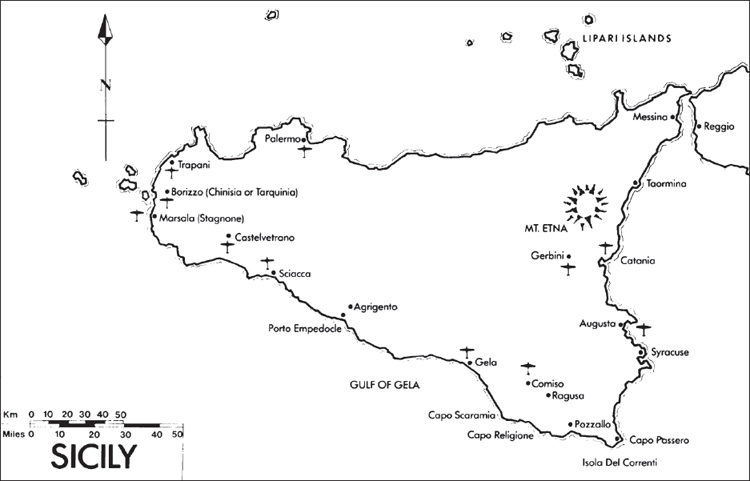
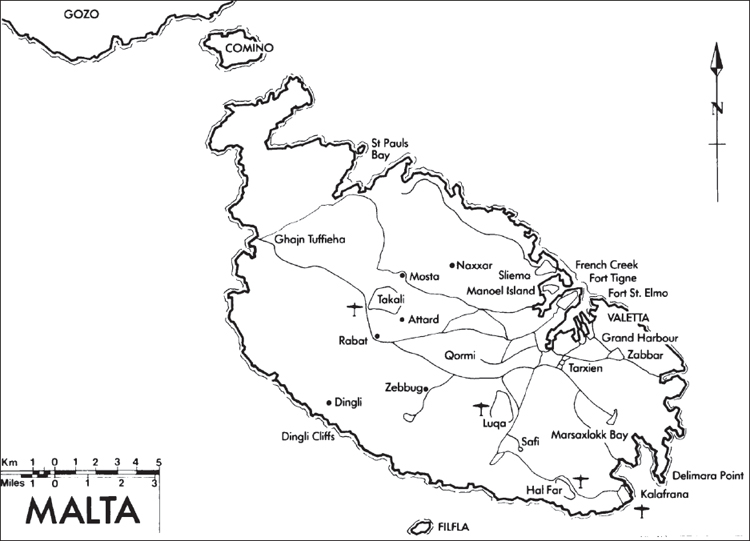
Stormy Prospects
Thursday, 9th January 1941
The news is greeted with a poignant hush and apprehensive expressions betray a sense of finality. Lieutenant Alan William Frank (Alfie) Sutton observes the sea of faces around him and his frown replicates others as he notes the lingering aura of silence, the air of discomfiture, with those present unwilling to be rushed into comment. The quiet spell is accentuated by the steady throb of machinery as men listen to the distant hum of the aircraft carriers Parsons turbines. When Lieutenant Sutton glances at his colleague seated nearby, he notes the officers sober expression, so uncharacteristic of his normally ebullient manner.
He returns his gaze to the commander in front. The commander, who stands and faces the officers to brief those not on watch or other immediate duty, has attempted to sound measured in his approach. However, those who know him well recognise that the senior officers awareness of moment and his turmoil of emotion have been betrayed by the occasional waver of his tone.
Now, those gathered in the wardroom seem uncertain how to react. Some officers look down, others glance upwards at the wardroom deckhead, a few stare blankly at their hands. All seem anxious to avoid letting slip their thoughts. Perhaps the men even fear the embarrassment of an inappropriate outburst. If women were present, thinks Sutton, the atmosphere would be different; there might even be the sound of nervous whispering in the background. Perhaps the female reaction would be less reserved, and more willing to reveal sentiments, recognition of how their situation has been drastically, alarmingly, transformed.
The commander makes a nervous gesture with one hand. So that, gentlemen, he says tersely, will present us, Im afraid, with a wholly different situation. He hesitates and wipes his brow. Others do the same as if made suddenly conscious of the intensity of atmosphere created by the ships air conditioning system. From now on well have to contend with an adversary of greater significance far greater than in the past.
Do we know, sir, asks one of the pilots, when these German squadrons are likely to be declared fully operational?
Captain Boyd is painfully aware of the sketchy nature of official intelligence, however weve made assumptions based on our own observations and on those of local contacts in Malta. It seems, though, that the Admiralty and the Air Ministry staff are convinced that the presence of the Luftwaffe will make little difference to the threat already posed by the Italian Regia Aeronautica. Whether the staff in London are trying to put a brave face on things, he shrugs, who knows? I think that most of us here and surely most others in the Mediterranean Fleet appreciate a different reality. It could be a mere matter of days, as the captain has suggested, before the Germans start to launch attacks, especially as we draw closer to Malta.
The commanders remarks are followed by a resumption of the wardrooms uncomfortable hush. The silence is broken eventually by a midshipman who half stands to ask: Is there, maybe, another aspect, sir?
Speak up, mister, interjects the commander; he points briskly with one finger towards the midshipman at the far end of the room.
I just meant to ask, sir the midshipman falters again, his anxiety apparent. All eyes in the room now turn hastily, impatiently, to observe the young man who struggles to sound coherent. Lieutenant Sutton feels sudden commiseration, a mix of sympathy and embarrassment, for the questioner and his predicament. He decides as if to help assuage the blushes of the midshipman to avert his gaze; he glances instead at a picture placed prominently on an adjacent bulkhead.
Next page
